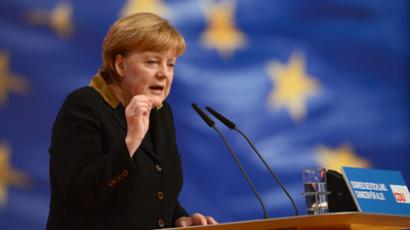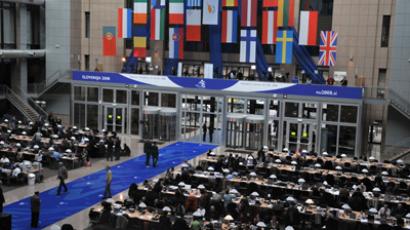EU agrees on new €960bn budget for 2014-20
EU member countries finally overcame differences over budget cuts and reached an agreement on the next heavily trimmed long-term budget for the union.
The agreement, which fixes EU spending over the seven-year period from 2014-2020, set a ceiling of 960 billion euros for appropriations. It will now go to the European Parliament for final approval, a process that could take several months. There is also a strong chance that the budget may be vetoed by the parliament. The deal comes a full day after leaders began arriving in Brussels for the summit.
Deal done! #euco has agreed on #MFF for the rest of the decade. Worth waiting for.
— Herman Van Rompuy (@euHvR) February 8, 2013
Van Rompuy's announcement went down well with the press corp: Martina Stevis a journalist present at the talks said that there was sporadic applause as soon as it became plain that a deal had been done. Van Rompuy added that "This is perhaps nobody's perfect budget deal".EU delegates had to agree a seven year EU spending budget with commitments of €960 billion, which amounts to a cut of €33 billion. The deal includes a €12 billion cut in EU spending compared to the proposal that was rejected in November, with infrastructure spending taking an €11 billion hit.The UK’s budget rebate, where Britain is paid back some money by the EU because it’s one of the biggest financial contributors, was retained but the amount the UK will have to pay into EU coffers annually could still rise.
François Hollande, the French President, has given a press conference and admitted it’s not his dream budget but that it was the best he could get under the circumstances, given the present fiscal situation. However, sources in Brussels say the French media were not impressed by Hollande's performance during the negotiations, as real term cuts to the EU budget were not top of Paris’s agenda. German Chancellor Angela Merkell has also held a press conference in which she said the deal was fair, and she highlighted that it included 6 billion euros of fresh money for Europe’s youth unemployment crisis.Meanwhile, Dutch media are reporting that prime minister Mark Rutte managed to reduce the cut to the Netherlands rebate by €45m (it was originally being cut from €1bn to €650bn), and that he only managed to secure this by threatening a veto.UK Prime Minister David Cameron speaking in Brussels said the EU budget is "more modern and effective" and a "good deal" for Britain."I fought off attempts to undermine the British rebate & the rebate is safe,” he added.
The budget is the first net reduction to the EU’s long term budget in the bloc’s history. It has met the demands of northern European countries who wanted further belt tightening, but promised more money, a further 1.5 billion euros, for farm subsidies and rural development satisfying France, Italy and Spain. The cuts in spending were found mainly in cross-border transport, energy and telecoms projects and around 1 billion euros was shaved off pay and perks for top EU officials, something that Britain had pushed for. But EU leaders won’t be breaking out the champagne just yet as the deal still faces certain hurdles. “The European Parliament will not accept this deficit budget if it is adopted in this way. That is certain,” Martin Schulz, the parliament’s president, said.














